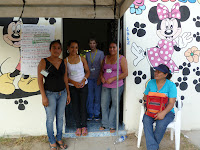

La tercera edad, the third age, is what they call being a senior citizen here in El Salvador - and come to think of it, it makes a lot more sense and poetry than "senior citizen." Last week we had a fiesta for people in la tercera edad at the Centro Arte para la Paz, complete with a band that knew how to play the old Salvadoran standbys for dancing - though when we got into rock tunes, a little later, could see that these are my contemporaries. We all danced to the Beatles back in the 60s, and we all could keep that beat going. Some segunda edad folk even snuck in to enjoy the dancing with us - Arielle on the left in the photo above is one of Peggy O'Neill's full-time volunteers this year. Great fun - there were prizes for all, including the oldest person there, a man of 99 who I often greet on the corner of my street, and the woman with most children - someone claimed she had 14, though when she stood up she only mentioned 10. Other prizes were raffled, even the two piñatas. We were served coffee and a refrigerio (a snack, the first time I met this word I had a terrible time disentangling it from refrigerator, refrigerador) and had a good time.
I knew some of the folk there by name, others by sight, and many were new to me, but it was fun to be among my contemporaries in la tercera edad.










